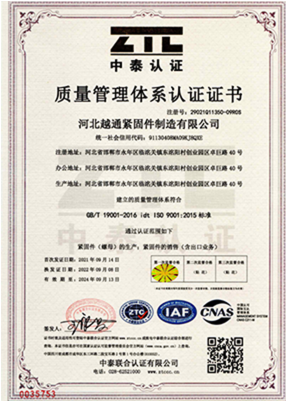des. . 11, 2024 18:42 Back to list
stainless anchor bolts
Understanding Stainless Anchor Bolts A Comprehensive Guide
Stainless anchor bolts are crucial components in construction and engineering, providing the necessary support and stability in various structures and applications. As industries strive for durability and resilience in their projects, the demand for quality materials like stainless steel has surged. This article delves into what stainless anchor bolts are, their types, advantages, uses, and considerations for selection to provide a clear understanding for engineers, builders, and DIY enthusiasts.
What are Stainless Anchor Bolts?
Stainless anchor bolts are fasteners made from stainless steel that are used to attach structures or equipment to concrete or masonry. They serve as an anchor point in a wide range of applications, securing items like steel girders, machinery, and even wooden frameworks. The strength and corrosion resistance of stainless steel make these bolts particularly suitable for harsh environments, including coastal areas where saltwater can accelerate corrosion.
Types of Stainless Anchor Bolts
Stainless anchor bolts come in various designs, each suited for specific applications. The most common types include
1. Straight Anchor Bolts These bolts have a uniform diameter and are used primarily in structural applications. They can be embedded into concrete or masonry to provide a strong connection.
2. L-Bolts Shaped like the letter “L,” these bolts are often used when there is a need to secure a component to a wall or a post. The “L” shape provides additional anchoring ability.
3. J-Bolts With a hook at one end, J-bolts are ideal for applications where a loop or a hook is required for attachment. They are commonly used in suspending structures or for securing items to ceilings or walls.
4. U-Bolts These bolts resemble a “U” shape and are typically used for fastening cylindrical objects, such as pipes, to structural elements.
5. Expansion Bolts Designed for fastening into hollow walls or brick, expansion bolts expand upon tightening, creating a secure fit. They are especially useful in applications where loading is dynamic.
Advantages of Stainless Anchor Bolts
The benefits of using stainless steel anchor bolts are manifold
- Corrosion Resistance Stainless steel is resistant to rust and corrosion, making these bolts ideal for use in environments exposed to moisture, chemicals, and extreme temperatures.
- Strength and Durability Stainless anchor bolts have high tensile strength, ensuring they can withstand significant loads without bending or breaking.
- Aesthetic Appeal With their smooth finish, stainless anchor bolts offer a visually appealing option for exposed applications, complementing architectural designs.
stainless anchor bolts

- Versatility These bolts can be used in various settings, from residential construction to large-scale industrial projects, due to their diverse range of designs and sizes.
Applications of Stainless Anchor Bolts
Stainless anchor bolts find applications in numerous sectors, including
- Construction Used to secure beams, columns, and other structural elements and reinforce concrete and masonry constructions.
- Marine Environments In shipbuilding and waterfront structures, stainless anchor bolts ensure longevity against the corrosive effects of seawater.
- Infrastructure Projects From bridges to highways, these bolts maintain the integrity and durability of critical infrastructure.
- Industrial Equipment In factories and plants, stainless anchor bolts are essential for mounting machinery and ensuring operational stability.
Considerations for Selection
When choosing stainless anchor bolts, several factors should be considered
- Material Grade Different grades of stainless steel offer varying degrees of corrosion resistance and strength. Common grades include 304 and 316, with the latter providing enhanced resistance to saltwater conditions.
- Load Requirements Assess the expected load and choose a bolt size and design that can handle the stresses of the application.
- Environment Consider the environmental conditions where the bolts will be installed, including exposure to chemicals, temperatures, and moisture.
- Installation Proper installation techniques are essential to ensure the effectiveness of anchor bolts. It is vital to follow manufacturer guidelines and industry standards.
Conclusion
In summary, stainless anchor bolts are indispensable in construction and various industries, combining strength, durability, and resistance to corrosion. Understanding the types, advantages, applications, and selection criteria of these bolts enables stakeholders to make informed choices, ensuring the safety and longevity of their projects. Whether for a small DIY task or a large construction endeavor, stainless anchor bolts offer a reliable and effective solution to meet anchoring needs.
-
The Ubiquitous Reach of DIN934 in Application Realms
NewsMay.16,2025
-
Exploring Different Bolt Types
NewsMay.16,2025
-
Cracking the Code of Sleeve Anchor Mastery
NewsMay.16,2025
-
Clamp Design Principles,Types and Innovations
NewsMay.16,2025
-
Artistry Inspired by the Humble Anchor Bolt
NewsMay.16,2025
-
A Deep Dive into Screw Types
NewsMay.16,2025


